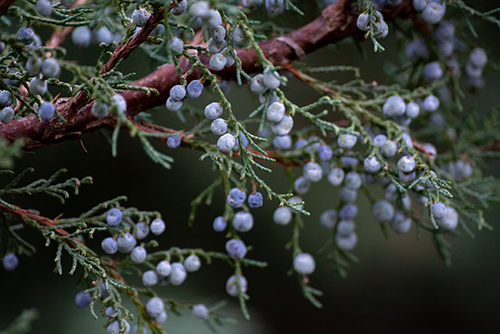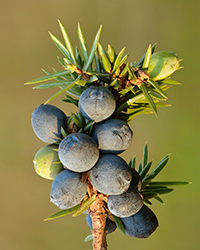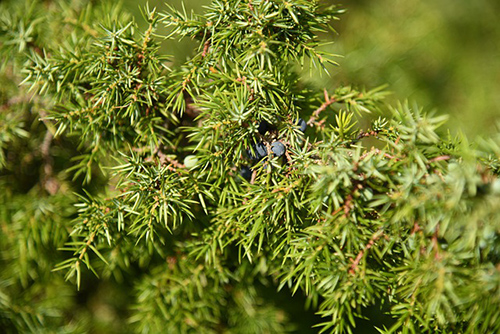Contents
The great Greek physician, pharmacologist, botanist, and author Pedanius Dioscorides, who lived in the 1st century A.D., knew the medicinal properties of the juniper plant fruit. However, juniper fruits have more applications than simply adding their aroma to some alcoholic beverages.

Juniper Plant Scientific Facts
- Other names: Common juniper.
- French: Genevrier.
- Spanish: Enebro, junipero.
- Environment: It is common in rocky soils and mountainous forests all over Europe and is also a naturalized species in America.
- Description: This is an evergreen shrub of the Cupressaceae family, growing from 1 to 3 m high. Its leaves are short and sharp-pointed. The fruit is small, blue, or black balls with a resinous, sweet flavor.
- Parts of the plant used medicinally: The fruit.
Healing Properties and Uses

The entire plant, especially its leaves, contains essential oil rich in terpenic substances. The berries contain sugar, resin, organic acids, and juniperin (a bitter glycoside). These BERRIES have the following properties:
- Diuretic. The essential oil of juniper increases glomerular strain on the kidneys, thus increasing urine production. However, when continuously taken, high doses of this plant induce the straining capabilities of the kidneys and can even produce nephritis. Juniper is recommended for edema caused by coronary insufficiency and as a purifying substance to eliminate excess uric acid.
- Expectorant and bronchial antiseptic. Since a significant part of its essence is eliminated via the lung airways, its berries have been used as a complementary treatment for bronchial and lung diseases, even tuberculosis.
- Appetizer, stomach invigorator, and carminative.
- Emmenagogue. They produce an increased blood flow towards the genitalia; thus, these berries are recommended to treat painful or scant menstruation.
- Revulsive. When externally applied with a massage, juniper ESSENCE in an alcoholic solution eases rheumatic and arthrosis aches.
With their diuretic-stimulating properties, Juniper berries are an excellent remedy for lower back pain, gravel, bladder catarrh, and urine retention. They can also treat uric acid buildup and bladder discharges. Take one to three drops of juniper oil with honey twice daily. The primary intake method is eating berries or making tea from them. The berries can eliminate excess water from the body.
The tea can be used as a good douche for vaginal infections. It can aid in treating prostate disorders, asthma, and fluid retention. The herb can also treat nephritis, lumbago, hay fever, bed-wetting, arthritis, allergies, bladder diseases, cystitis, and diabetes.
Juniper berries are also helpful in treating gouty and rheumatic pains, gonorrhea, leukorrhea, gastrointestinal infections, and cramps. It is also a fantastic digestive tonic. It can also manage blood sugar levels and lessen the production of stomach acid (hydrochloric acid). As a spice, the berries enhance flavor, counteract flatulence, and stimulate the appetite.
Externally, the oil derived from berries can easily penetrate the skin and is excellent for bone and joint ailments. The boiled berries can be used as a disinfectant and sprayed within rooms where sick people have been. In the past, nurses and caregivers of seriously ill patients were told to chew a few berries to shield them from the pathogenic elements that can be inhaled.
Juniper berries are among the most widely used herbal diuretics. In Germany, it is approved as a tea to remedy stomach conditions and stimulate the appetite. Science confirms its anti-inflammatory and spasm-reducing properties, which some believe lend to its diuretic activity. The fruits eaten raw or made into tea served as folk remedies for bronchitis, colds, colic, antiseptics for intestinal infections, carminatives for flatulence, and urinary antiseptics for cystitis. In external applications, it was used for snakebites, arthritis, rheumatism, aches, cancer, and sores.
How to use Juniper

- Ripe berries. They can be taken whole as pills, six after every meal, three times a day.
- Infusion.
- Essence.
- Massage with juniper essence dissolved in alcohol, 20 to 30 drops per 100 ml.
Infusion: Steep for five to fifteen minutes and take three ounces, one to three times daily. Decoction: Simmer for five to fifteen minutes and take one to two cups daily. Tincture: Take five to twenty drops three times daily. Fluid Extract: Take ½ to one teaspoon three times daily. Oil: Take one to three drops two times daily. Powder: Take up to 10 #0 capsules (up to 60 grains) daily.
WARNING! Juniper berries are potentially toxic. Frequent or large doses can result in kidney failure, digestive irritation, and convulsions. Germans limit its medicinal use to four weeks. Please do not use it during pregnancy. The oil has the potential to cause blistering.
Excessive doses of juniper berries can irritate the urinary passages and kidneys and interfere with iron and other mineral absorption. Pregnant women and people with kidney disease should not use them. Please do not use them for extended periods, especially for inflammatory or urinary tract diseases. If placed on the skin in large amounts, the pure oil can result in blisters and inflammation.
DISCLAIMER: All content on this website is presented solely for educational and informational objectives. Do not rely on the information provided as a replacement for advice, diagnosis, or treatment from a qualified medical expert. If you are pregnant, nursing, or have any preexisting medical concerns, talk to your doctor before using any herbal or natural medicines.
REFERENCES
- George D. Pamplona-Roger, M.D. “Encyclopedia of Medicinal Plants.” George D. Pamplona-Roger, M.D. Encyclopedia of Medicinal Plants. Ed. Francesc X. Gelabert. vols. 2 San Fernando de Henares: Editorial Safeliz, 2000. 577. Print. [juniper plant]
- Vance Ferrell Harold M. Cherne, M.D. The Natural Remedies Encyclopedia [Book]. – Altamont, TN: Harvestime Books, 2010. – Vol. Seventh Edition: 7: pp. 165.
- https://my.klarity.health/health-benefits-of-juniper-berries/
